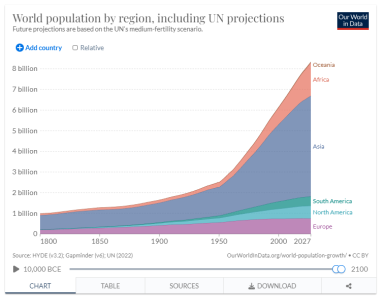I mean, you can keep on adding more and more obtuse countries to the list if you want, but if you want a discussion, maybe don't make claims for other people that they didn't make.You and @Lexicus can claim that Iceland, Korea and Slovenia had something to do with colonialism, but at this point I'm just going to point at this :
What countries are increasing their population by five to ten times in seventy years?Let the wealthy (the actual ones, who gain billions with the system, not the worker in an overall country that already has trouble meeting end and somehow gets accused of "benefiting colonialism") pay their share. Heck, give a larger part of my taxes if we can ensure that it does end up making a difference (not fond of just giving it to warlords). Punish waste. Reward efficiency. Tax excessive consumption. Develop new technology for better use of what we have. I'm fine with all that.
But don't ask me to cut on what should be acceptable consumption if the population hadn't multiplied by five in a single century. And yes I will blame countries for their population explosion just like you blame countries for colonialism. I don't buy the argument that some countries have all responsabilities and others have none.
As for "our" population explosion, France went from 26 millions in the 1700s to 66 millions today (and a good 5 to 10 millions come from immigration and not natural growth). That's just doubling population in 250 years. We're talking about countries getting five to ten times more populous in 70 years. So yeah, I'm already considering "ours". If the world had only doubled its population since the XVIIIth century, I don't think overpopulation would be a problem today.
Looking at the attached graph (which I got from playing around with the date settings on the same graph here) - it's hard to tell from the screenshot, but I've clipped it to 2027 instead of the projected 2100, and the only continent that matches that kind of growth is Africa (and that's less than six times, which is significantly less than ten times). Bearing that in mind, Africa's base % in 1950 was less than Europe. Comparable with North America.
So I can't help but think you're putting the blame in the wrong place. You're fixating on the relative measurement that sounds the highest (5 to 10 times) without actually looking at how the numbers shake out. And again - this is because of advancements in medicine (and the like) that any developing or developed country should have access to. I sincerely doubt you're saying they shouldn't be able to have this; to benefit from a similar increase in life expectancy that we've been able to benefit from? Like, I basically flat-out don't believe you think that. So why focus on the % increase, when the base numbers are so low? Could it be because this is only a problem when we introduce (Western, capitalist) overconsumption into the equation?
That said, I agree we should let (or rather, make) the wealthy pay their share. Once again, nobody said anything about workers who have trouble making ends meet. Nobody is accusing the working poor of "benefiting colonialism" in any way. I doubt anybody's even thinking it beyond the academic technicality that their country (of origin) has benefited. The people haven't necessarily in material terms. You need to stop putting peoples' words in their mouths.
Like, look at Oceania. It should be very obvious that population is completely the wrong angle when discussing overconsumption, and the damage being done to the Earth. Otherwise they'd be not affecting it at all, and I think it's pretty tame to suggest that Australia, in fact, does have quite a bit to do with the current ongoing ecological crisis (among other things).




